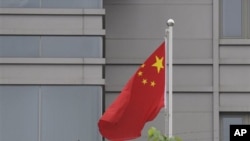The United States is struggling under a flagging economy, and China has continued to grow economically and to spread its influence abroad. But Cambodian rights leaders and opposition politicians say that while China may continue to expand its reach, it is not yet in a position to challenge the global role of the US.
“In general, people—not leaders—people in any country may not welcome China more than the United States,” Kem Sokha, president of the minority opposition Human Rights Party, said.
Chinese operations in Cambodia, for example, can be secretive, whether in infrastructure, dams, power, mining or other arenas, and so they lack assurances for the general public, he said.
“Because there is no transparency, because when China starts, it only deals with leaders, which is not transparent with people, then the people who are victims of economic exploitation are not happy,” he said. That means they will demand greater rights, he said, “especially in economic equity and political equity and social equity too.” In China, “this does not exist,” he said.
However, Cheam Yiep, a senior lawmaker for the ruling Cambodian People's Party, said that China's growth and the US's continued struggle for economic recovery, mean that China can become one of the world's superpowers.
“So China, as a superpower country and as a permanent member of the UN Security Council, can cause rain and thunder gradually against US influence in the Asia-Pacific region as well as the world,” he said.
China has made great economic strides since the collapse of the Soviet Union, posting double-digit growth and improving the income of its citizens, he said. That growth is spreading from the cities to rural areas, which will eventually “allow people to live with equal standards,” he said. “That's an important principle.”
Responding to criticism of China's human rights record and lack of democracy, Cheam Yiep said the country's population of 1.3 billion people, four times that of the US, means it must have good administration.
Ou Virak, director of the Cambodian Center for Human Rights, disagrees.
China has failed to fulfill many tasks for its citizens, he said, and it does not participate in world development, which damages its influence on the international stage.
“China needs to invest more time and resources before China can be a model the world needs to listen to,” he said. “Having influence to change the international political situation at this time is impossible.”
China cannot compete with the US technologically, and many of its citizens struggle with poverty, he said. “China is indeed rising, but I don't see it moving fast, so I don't anticipate China becoming a pole superpower...for at least 20 more years.”
Still, he said, Cambodia must pay attention to movements of world power, especially with the US recession and China's growth.
A changing global power structure will necessitate changing international policies, he said.
Sam Rainsy, the leader of the main opposition party, said China would need 20 or 30 years to reach the level of the US.
“So the US still leads,” he said. The US GDP per capita remains high compared to China with its large population, he said. And China must deal with inflation that can create unease and a gap in living standards among its people.
“The majority of the population, which is still living under poverty, can be a social problem, a political problem for China, especially the Communist Party,” he said. “One says 'communist,' but China is not communist anymore, so they must take action to balance on some level and not allow a large gap between the rich and poor.”
For Ou Virak, the question is whether continued growth will mean people demand more of the Chinese government.
“When its own citizens have enough rice to eat, will its people begin to make claims for freedom, or not?” he asked. “The answer is that the world has shown that whenever there is fast economic growth, then there is the beginning of demands for freedom. And can China resist, and manage such economic growth as today for the next 10 years, or not? The answer, we do not know.”
Sam Rainsy said one key to China's growth—and Vietnam's as well—is changes in leadership, despite its system of government, that bring fresh ideas and change.
Cambodia remains stagnant, he said, because its leaders “cling to power.”
“They do not want to have a change, because whenever there is a change, it is revelatory,” he said. Change can uncover secrets once the newcomer takes power, he said, and in Cambodia, that would mean revealing government corruption. “So they must maintain the same leaders for 20 or 30 years.”
Government spokesman Phay Siphan said Vietnam and China demonstrate that one-party systems can bring prosperity.
“Change is not a big element to success in the people's interest,” he said. “The people's interests are in peace, political stability and the generation of opportunity.”




